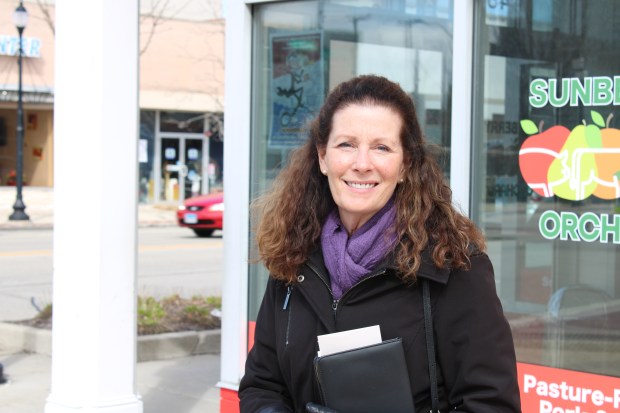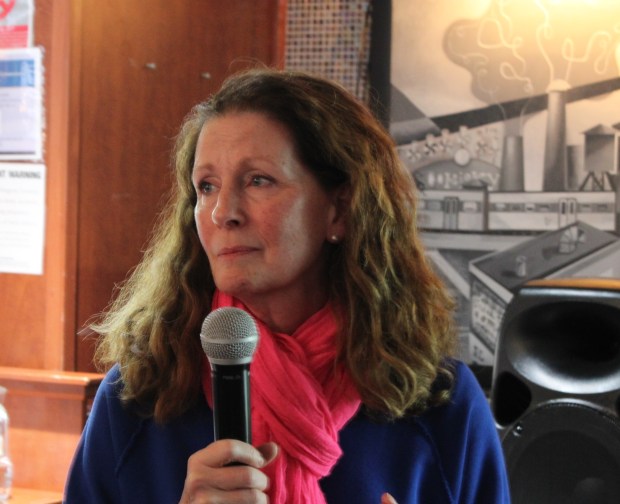A week after Ann Tennes declared victory in her campaign to be Skokie’s second mayor in this century, she spoke to Pioneer Press about her initial plans to lead the village of 67,000 residents.
Tennes, who worked for the village from 1998 to 2023 as the director of marketing and communication, said she aims to get more community involvement in the village’s decision making. Tennes will be sworn in as mayor at the next Village Board meeting April 21.
“My number one priority is to bring together the new (Village) Board. It’s a new day in Skokie, and we need to come together as a Board and set a tone where we all participate in a respectful, collegial manner,” Tennes said.
Tennes’ interview with Pioneer Press has been edited for length and clarity.
Q: This board is comprised of two incumbents and four new trustees, some of whom have not previously held elected office. How do you see them gelling to work together cohesively?
“That’s central to why I ran, because I envisioned that there would be individuals serving who had never served before.
“One of the first things that I think we need to do is the development of a strategic plan. Skokie does not have a strategic plan, and what a strategic plan does is bring elected officials together.
“But it also, and importantly, engages the community to talk about values, vision, priorities and, it’s a lot of listening, but at the end of the day, it focuses the elected officials on what the community wants, and from there we set our vision, our mission, our values.”
Q: What have you heard from the community so far?
“What I’m hearing is people are excited to get involved, that it truly feels like a new day in Skokie.
“We need more seats at the table, and together with my fellow newly elected or newly re-elected officials, I look forward to making space at the community table, so to speak, for anyone who wants to be involved, whether it’s through service on the Village Board or a commission. Whether it’s serving in another type of advisory capacity, whether it’s being involved with one of our nonprofits or other partners in the community.”
Q: When it comes to community involvement, there are times when a small group of people may be more vocal about a subject. How do you balance the small group voices versus what you might think is a better option for Skokie?
“We have to look at many different options for hearing from residents, not just those who can come to meetings or weigh in.
“People are busy. They have families. It’s not always convenient for people to come out to Village Board meetings.
“Being present in the community and listening and making sure that we intentionally invite community members who maybe have not been heard to the extent that they would like to be heard, inviting them in with intention to be part of these conversations.”
Q: What economic incentives are you hoping you can dole out to businesses?
“Our resources are finite, and we have many demands on our resources: infrastructure, pensions…many things. But what I heard over and over again from residents in every corner of Skokie during the campaign, and I also heard this during my years with the village: people want more small businesses.
“People seem to understand that Westfield Old Orchard is an economic engine for Skokie… The village has done the work that needed to be done to get Old Orchard on a path to continue to grow as Skokie’s economic engine.
“What I heard is that residents are excited to have more small businesses, not just in downtown, but throughout Skokie.
“Programs such as the Storefront Enhancement Program have assisted businesses in downtown Skokie and the Main-Crawford corridor.
“But those funds are paid to the business in arrears (after they pay out money), so it’s incumbent on the business to source the gross amount of money first do the improvements and then seek reimbursement. What I’ve heard from small business owners in Skokie, some of whom have received these funds, is that it can be hard for small businesses to front the whole amount and then wait to get paid back.
“To be clear, we have to do our due diligence. We have to have a firm process in place to make sure that when we are giving these taxpayer resources to businesses, that they have a clear plan and that they will be good partners for the village. But maybe there are ways that we can have points along the way… where if they meet certain thresholds, they get a partial reimbursement.
“I also think, and I’ve seen it time and again in different communities, successful small business breeds successful small business. I think we’re seeing that already in downtown Skokie on Lincoln Avenue. I’ve been telling people, look at where this new flower shop Botanik Culture is. Just follow Lincoln Avenue all the way to the Skokie Theatre and you’ll see the results of successful small business drawing the attention of other entrepreneurs. So we need to extend that energy.”
Q: What is your opinion on tax increment financing?
“Skokie has a history of doing a good job with TIFs… I think they can be used as a good tool, but we have to be careful with them. There’s a lot of due diligence that needs to be done, a lot of financial reporting, and we have to make sure that the plans are clear for what will happen to that increment.
“To be clear, I’m not advocating for new TIFs. That’s nothing I’m even thinking about at this point. But I think when warranted and when carefully studied and put in place thoughtfully, they can serve a purpose.”
Q: What is your take on how the village should approach the next steps for that downtown hotel?
The village has spent over $10 million in TIF funds for the incomplete Hilton Hotel.
“During the campaign, I would say nine out of every 10 conversations I had with residents included mention of the hotel.
“I’ve pledged that within 30 days of taking office, there will be a report to the community about the hotel that will be an agenda item discussed in public session.
“We have to start with giving a report before the end of May of 2025, and continue with regular reports. I’ll work with the village manager to decide what that increment needs to be… maybe every two months, something like that.
“I think it’s important that we take a fresh look at the agreements for both the hotel and Highpoint at 8000 North. Not just the agreements, but the amount and the scope of the due diligence that was conducted on those partners, for the hotel, for the current partner for Highpoint.
“I think it’s incumbent on leadership to take a second look at this. I see this as a pattern, and I want to make sure that we break that pattern.”
Q: Do you have any concerns at all with the development at Old Orchard? Might those plans need a second look before construction even starts?
“I think it’s premature. I don’t think I could say… I want to look at that agreement because I want to make sure that Westfield is being a good partner to the village and living up to their obligations. I have no reason to think they’re not, but I want more clarity on that.”

Q: Speaking to your Park Ridge days… Uptown Park Ridge is really walkable, and people seem to like that. How can you make downtown Skokie more walkable?
“In the late 90s, I served on Park Ridge’s Zoning Board. Within a year or two, I was appointed to the Uptown Task Force. There were probably 25 or 30 community members on this task force.
“If you had told me that Uptown Park Ridge was going to look and feel like it does today, we would have been thrilled, and we need that same type of focus and energy in Downtown Skokie.”
Q: What is your take on the village’s affordable housing?
“The village has the new (affordable housing) ordinance that went into effect in 2024. We need to see how that plays out.
“The balance I see is having a requirement in place that doesn’t chill development, because if the requirement is too onerous, it will chill development, and that’s contrary to what we want.
“As the new Board, we will want to take a look at the Housing Sub-Committee. Make sure that the composition of that committee has differing views, differing opinions and some experts as well.
“And I’m not saying it doesn’t. I just know that I’m going to want to take a look at it.”
Q: What do you make of the village’s affordable housing ordinance?
“I like the fact that they’ve tiered it. Without a village subsidy, there’s a lesser requirement (for affordable units). With a village subsidy, there’s a greater requirement (for affordable units). I think that’s appropriate.”



